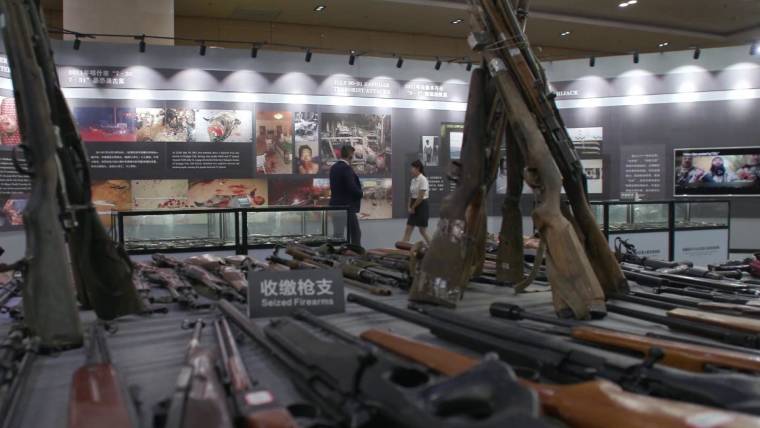LONDON — China’s approach to human rights and its relationship with global sports was once again in the spotlight this weekend after a soccer star criticized the country’s treatment of its Uighur Muslim minority.
Mesut Özil, a prominent player for English soccer club Arsenal, denounced China’s policies toward its Muslim residents in a post on Twitter and Instagram Friday.
He was met by criticism online in China, and an apparent decision from Chinese TV not to broadcast Sunday’s marquee game involving the club.
The controversy comes months after the NBA faced a sustained backlash after Houston Rockets GM Daryl Morey expressed apparent support for protests in Hong Kong.
The high-profile incident developed into a crisis for the league.
Now soccer may have to confront the same questions.
In his social media posts Özil, who is Muslim, called Uighurs “warriors who resist persecution” and criticized both China’s crackdown and the silence of Muslims in response.
He told his more than 20 million followers, in a post translated from Turkish: “Qurans are burned, mosques were closed down, Islamic theological schools, madrasas were banned, religious scholars were killed one by one. Despite all this, Muslims stay quiet.”
Let our news meet your inbox. The news and stories that matters, delivered weekday mornings.
Arsenal, which has a large following in China and has previously toured the country, sought to distance itself from the comments.
In a statement posted to its official account on the Chinese social media platform Weibo, Arsenal insisted that the player was not speaking for the club and that it remains apolitical.
“The content he expressed is entirely Özil’s personal opinion,” the statement said.
But on Sunday, the state-run newspaper Global Times said state-run CCTV would no longer be broadcasting Sunday’s English Premier League clash between Arsenal and Manchester City, which is scheduled to kick off at 11:30 a.m. ET.
It said the decision was made after Özil’s “false comments on Xinjiang disappointed Chinese fans and football governing authorities.”
Arsenal’s post on Weibo was met with angry replies, with one showing a shredded Özil soccer jersey next to a pair of scissors and others demanding he be expelled from the club.
The response from China echoed that which met the Rockets and the NBA in October.
The broadcasts of preseason NBA games were canceled and events in the country were met with protests, throwing a wrench into the league’s push to cultivate loyal spectators and court powerful investors in the country.
Arsenal, and the Premier League more broadly, has similarly tried to expand its Chinese following. The club opened its first Arsenal-themed sports bar and restaurant in Shanghai last year.
But human rights issues have now again reared their head.
An estimated 1 million people have been detained in China’s network of Muslim internment centers across the western province of Xinjiang.
After long denying Uighur, Kazakh and Kyrgyz ethnic minorities were being detained on accusations of terrorism or extremist leanings, Chinese authorities began to acknowledge the existence of these camps in late 2018.
However, officials said the centers are vocational training centers for the unemployed and boarding schools.
Documents from state authorities leaked earlier this year revealed the camps were designed for ideological transformation, political brainwashing and erasing culture.
New York-based nonprofit Human Rights Watch said in a 2018 report that China was inflicting “rampant abuses” including torture and unfair trials on the Muslim population.
Sports stars aren’t the only social media users attempting to spread awareness of the issue.
On TikTok, teens and young people around the globe have been creating videos to draw attention to China’s the treatment of Uighurs.
Users of the social media platform, which is owned by Beijing ByteDance Technology Co., have also alleged they have been censored as a result of their criticism.
Reuters contributed.













